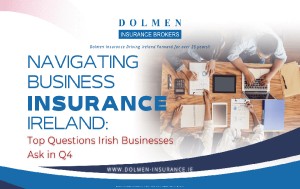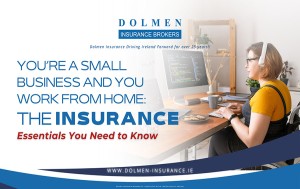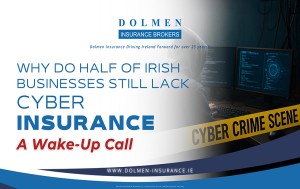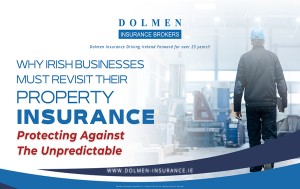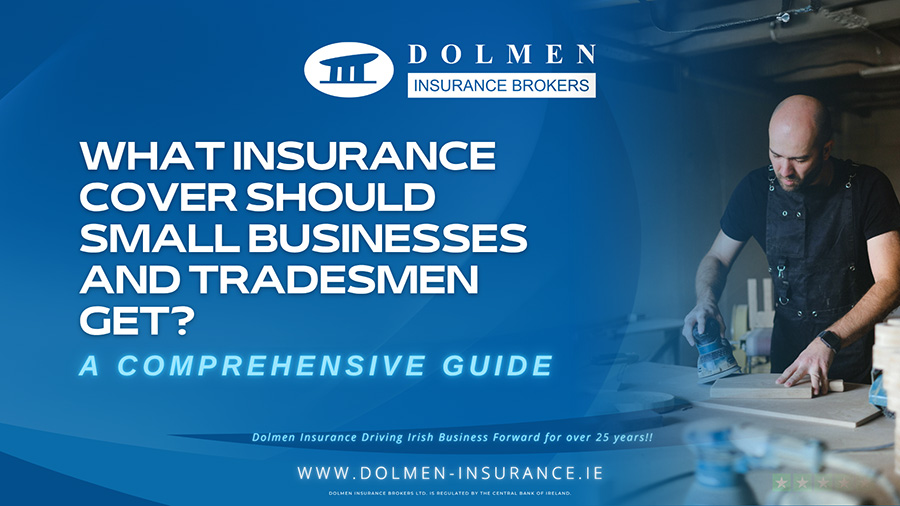
Running a small business or working as a tradesman in Ireland offers independence, flexibility, and the chance to build something of your own. But with that opportunity comes responsibility, and risk. From accidental injuries to equipment damage, legal disputes to business interruptions, unforeseen events can quickly become costly. The right insurance doesn’t just protect your livelihood, it safeguards your future. Whether you're a sole trader, contractor, or managing a growing team, understanding the right cover is essential.
To protect your business, you need the right insurance. This guide over an overview and explains essential covers, good practice, broker benefits, choosing wisely, and saving money. Whether you run a carpentry business, plumbing service, café or hair salon, these insights will help
What are the essential policies for small business?
Each enterprise has unique exposures. However, some covers are almost always needed.
Public liability insurance
Public liability insurance is one of the most important covers for any small business or tradesman in Ireland. It protects your business if a third party, such as a customer, supplier, or member of the public, is injured or their property is damaged due to your business activities.
For example, if a customer slips on a wet floor in your shop, or if a tradesman accidentally damages a client’s property while on-site, public liability insurance covers legal fees, medical expenses, and compensation costs.
While not legally required, it is often mandatory to secure contracts, rent commercial space, or work with local authorities. Many businesses are also required to carry minimum levels of cover under trade body or client agreements.
According to the Central Bank of Ireland, 8,600 liability claims were settled in 2022, costing over €268 million. Despite this, liability premiums increased by 8%, highlighting how vital this cover remains amid rising risks and costs.
Public liability is usually included in combined business policies and can be tailored to suit your trade or premises. Whether you're a sole trader or run a team of employees, this insurance gives peace of mind and protects your reputation.
Talk to your broker to ensure your policy limits reflect your actual exposure. Higher-risk trades or work in public spaces may require increased cover.
Employers’ liability insurance
If your business employs staff, whether full-time, part-time, or on a casual basis, employers’ liability insurance is essential. In Ireland, it is not currently a legal requirement, but it is strongly advised and often contractually required. This cover protects you if an employee is injured or becomes ill due to their work. It covers legal costs and any compensation awarded.
From construction firms to cafés, accidents happen. A slip in the kitchen or a back injury from lifting stock can quickly lead to a claim. Employers’ liability ensures that your business won't face financial ruin from such incidents.
Most insurers offer this cover as part of a combined policy with public liability. Always ensure your limits are sufficient based on your staff size and activities. If you use subcontractors, discuss this with your broker, specific clauses may apply depending on how they’re classified.
Property insurance
Whether you own or rent premises, contents such as tools, stock and equipment can be damaged by fire, flood or vandalism. At Dolmen we offer tailored commercial packages including buildings, contents and stock cover.
Business interruption cover
If a covered event stops you trading, this pays lost income. It’s especially useful if your premises undergo repair after damage. A standard business‑owner policy (BOP) often bundles this with property and liability.
Professional indemnity (PI) insurance
For tradesmen who give advice or design plans, PI covers mistakes or omissions. Architects, engineers, electricians or decorators all benefit. Without it, a client’s claim could threaten your finances.
Commercial vehicle insurance
If you use vans, trucks or bikes, you’ll need motor‑trade or fleet cover. Dolmen offers commercial van and fleet insurance tailored to small operators dolmen-insurance.ie.
Tools and equipment insurance
Standalone cover for stolen or damaged PPE, power tools or specialist gear is important. It is often included or available as an optional add‑on.
Cyber insurance (optional, but in 2025 extremely important)
Modern businesses are increasingly vulnerable. Irish SMEs are now target attributions in cyber fraud, and research shows many lack proper defences. Cover helps with data breaches, tech malfunction and ransom demands.
Legal expenses insurance
In Ireland, legal costs can be high. Half of respondents to a Ipsos survey in Ireland said they feared dispute‑costs. Legal expenses cover helps with contract disputes, redress claims and employment issues.
What is good practice
Beyond having policies, how you manage them matters greatly.
- Review annually. Your needs change. Add coverage when expanding or renaming. Remove unused assets.
- Maintain discipline. Keep logs of maintenance, training or inspections. It shows insurers you manage risks proactively.
- Get documented evidence of safety. For example, display hygiene certificates if you run catering. That cuts risk and cost.
- Bundle where possible. A Business Owner’s Policy (BOP) bundles liability, property and interruption cover. It can reduce premiums
- Declare higher‑risk tasks. If you subcontract scaffolding, painting on ladders, or height work, tell your broker. That ensures valid cover.
- Train staff. Provide safety training. Install PPE, warning signs and vehicles with safety decals. Better risk management can reduce claims frequency.
- Report small incidents. Near‑misses may indicate gaps in cover or safety. Capture them before something bigger happens.
- Store backups offsite. For digital records, cloud backup can repay policy and prevent data loss interruption.
- Improve security. For tools, invest in alarms, lockable storage units and insurance‑approved locks. This can lower premiums.
Why should small businesses use a broker?
Using a broker is often smarter than buying direct. Here's why:
1. Bespoke policy solutions
Brokers match you with insurers specialising in your sector. Dolmen’s solutions for plumbers, carpenters and cafés illustrate this .
2. Comparative shopping
Insurers price risk differently. Brokers shop several options.
3. Guidance on complex wording
Insurance policies are filled with exclusions and conditions. A broker clarifies them. They also ensure your operations fall within cover.
4. Documentation handling
Brokers file declarations, process renewals and record changes. You avoid missed deadlines or coverage lapses.
5. Claims advocacy
If you claim, your broker manages communications with insurers. That reduces stress and speeds payout.
6. Long‑term relationship
Over time, your broker learns your risk profile. That helps with early identification of gaps.
In short, brokers save you time, worry, and in many cases, money.
What are the key factors in choosing the right cover?
Selecting the right coverage requires care. These factors must be weighed.
Nature of your business
Tradesmen carry physical tools and work on third‑party premises. Retailers stock goods. Offices hold clients. Your sector dictates the cover needed.
Revenue and workforce
High turnover or many employees increase sum insured and limits needed. A solo electrician may need lower liability than a 10‑employee firm.
Risk profile
Work in high‑risk sectors (roofing, scaffolding, mechanical repairs) requires higher limits for public/employer liability.
Assets owned
Premises, machinery, stock and vehicles all need insured values. Ensure your broker helps you calculate rebuild and replacement costs.
Legal & contractual requirements
Certain clients require PI or specified liability limits. Public sector contracts often demand higher indemnity limits.
Policy excesses and exclusions
A cheap premium may hide high excesses or exclusions. Brokers ensure you get cover that actually works when needed.
Reputation of insurer
Check financial strength and claims history. Central Bank Ireland reports can help assess insurer solvency.
Broker relationship
Your broker should explain covers clearly, be responsive, and understand your business.
What tips are there for helping reduce premium costs
Insurance is a cost, but smart planning can reduce it.
1. Increase deductibles/excess
If your business and bank can handle small claims, opting for higher excess can reduce your premium.
2. Bundle policies
As noted, BOP packages offer economies. They reduce admin and risk overlap
3. Maintain claims records
A clean claims history shows you manage risk well. Many insurers reward healthy histories.
4. Improve safety standards
Regular inspections, staff training, rigid health‑and‑safety standards—these all signal controlled risk, cutting costs.
5. Use security enhancements
Install CCTV, monitored alarms, lockable vans and secure storage. This reduces theft risk and insurer exposure.
6. Provide detailed documentation
Every asset should be logged with purchase date, cost and serial number. In a claim, you’ll get correct replacement value.
7. Shop around
Don’t renew automatically. Market changes. Brokers can quote different insurers each year and secure competitive offers .
8. Ask for discounts
Many insurers give lower rates to associations, trade bodies, or professional groups. Ask your broker if you qualify.
9. Review sums insured
Ensure you are neither under‑insured nor over‑insured. Inflating insured values increases premiums unnecessarily.
10. Take advantage of safety grants
Keep an eye on state‑backed safety improvement grants (e.g. local enterprise boards). They reduce risk and cut costs.
What next
For small businesses and tradesmen in Ireland, insurance is not optional. It is a foundation of responsible risk management. At a minimum, you should hold public liability, employers’ liability, property, business interruption and vehicle cover. You may also need PI, tools, cyber and legal expenses insurance based on your activities.
Good insurance practice involves annual review, bundling policies, strong documentation, safety and security measures. Choosing a broker provides tailored advice, policy comparisons and professional claims support.
David Broderick, Director, Small Firms Association (SFA), stated in May 2024:
“Our research shows that 64 percent of businesses … rising costs is the biggest challenge… 45 percent of small businesses say insurance costs have contributed to overall rising costs.”
Talk to our business insurance team today. We’ll walk you through policies, help find cost‑saving options and handle claims swiftly, freeing you to focus on growth.
Protecting today ensures tomorrow’s chances of success. If you run a café, plumbing firm or retail store in Ireland, act now: review your risks, assess your cover, and ask whether your insurance reflects your business today—and tomorrow.
Disclaimer:
The information provided in this blog is intended for general guidance and informational purposes only. While every effort has been made to ensure the accuracy of the content at the time of publication, Dolmen Insurance Brokers Ltd accepts no responsibility for any errors, omissions, or inaccuracies. Insurance needs vary by individual circumstances, and readers should not rely solely on the information contained herein when making decisions. We strongly recommend consulting with a qualified insurance advisor or broker to assess your specific requirements. Dolmen Insurance Brokers Ltd is regulated by the Central Bank of Ireland.
If you’d like Dolmen Insurance to review your current policies or explore tailored business insurance, contact our team in Dublin. We handle the heavy lifting, so you can get on with what matters.
